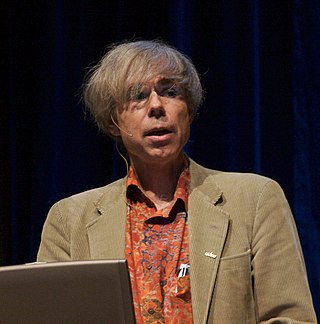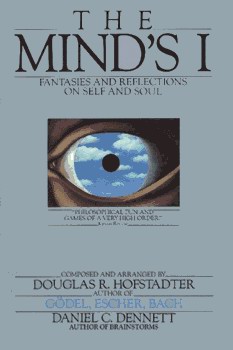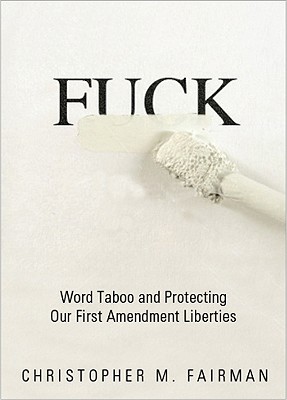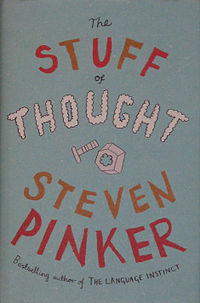
Douglas Richard Hofstadter is an American cognitive and computer scientist whose research includes concepts such as the sense of self in relation to the external world, consciousness, analogy-making, strange loops, artificial intelligence, and discovery in mathematics and physics. His 1979 book Gödel, Escher, Bach: An Eternal Golden Braid won both the Pulitzer Prize for general nonfiction and a National Book Award for Science. His 2007 book I Am a Strange Loop won the Los Angeles Times Book Prize for Science and Technology.
In computer science, the ELIZA effect is the tendency to project human traits — such as experience, semantic comprehension or empathy — into computer programs that have a textual interface. The effect is a category mistake that arises when the program's symbolic computations are described through terms such as "think", "know" or "understand."

Profanity, also called cursing, cussing, swearing, bad language, abusive language, foul language, obscenity, expletives, vulgarism, or vulgarity, involves the use of notionally offensive words for a variety of purposes, including to demonstrate disrespect or negativity, to relieve pain, to express a strong emotion, as a grammatical intensifier or emphasis, or to express informality or conversational intimacy. In many formal or polite social situations, it is considered rude, and in some religions it is considered a sin. Profanity includes slurs, but there are many insults that do not use swear words.

Steven Arthur Pinker is a Canadian-American cognitive psychologist, psycholinguist, popular science author, and public intellectual. He is an advocate of evolutionary psychology and the computational theory of mind.
Psycholinguistics or psychology of language is the study of the interrelation between linguistic factors and psychological aspects. The discipline is mainly concerned with the mechanisms by which language is processed and represented in the mind and brain; that is, the psychological and neurobiological factors that enable humans to acquire, use, comprehend, and produce language.

The Mind's I: Fantasies and Reflections on Self and Soul is a 1981 collection of essays and other texts about the nature of the mind and the self, edited with commentary by philosophers Douglas R. Hofstadter and Daniel C. Dennett. The texts range from early philosophical and fictional musings on a subject that could seemingly only be examined in the realm of thought, to works from the twentieth century where the nature of the self became a viable topic for scientific study.

Conversation is interactive communication between two or more people. The development of conversational skills and etiquette is an important part of socialization. The development of conversational skills in a new language is a frequent focus of language teaching and learning. Conversation analysis is a branch of sociology which studies the structure and organization of human interaction, with a more specific focus on conversational interaction.

The Language Instinct: How the Mind Creates Language is a 1994 book by Steven Pinker, written for a general audience. Pinker argues that humans are born with an innate capacity for language. He deals sympathetically with Noam Chomsky's claim that all human language shows evidence of a universal grammar, but dissents from Chomsky's skepticism that evolutionary theory can explain the human language instinct.

Constructivism is a view in the philosophy of science that maintains that scientific knowledge is constructed by the scientific community, which seeks to measure and construct models of the natural world. According to constructivists, natural science consists of mental constructs that aim to explain sensory experiences and measurements, and that there is no single valid methodology in science but rather a diversity of useful methods. They also hold that the world is independent of human minds, but knowledge of the world is always a human and social construction. Constructivism opposes the philosophy of objectivism, embracing the belief that human beings can come to know the truth about the natural world not mediated by scientific approximations with different degrees of validity and accuracy.
The study of how language influences thought, and vice-versa, has a long history in a variety of fields. There are two bodies of thought forming around this debate. One body of thought stems from linguistics and is known as the Sapir–Whorf hypothesis. There is a strong and a weak version of the hypothesis which argue for more or less influence of language on thought. The strong version, linguistic determinism, argues that without language there is and can be no thought, while the weak version, linguistic relativity, supports the idea that there are some influences from language on thought. And on the opposing side, there are 'language of thought' theories (LOTH) which believe that public language is inessential to private thought. LOTH theories address the debate of whether thought is possible without language which is related to the question of whether language evolved for thought. These ideas are difficult to study because it proves challenging to parse the effects of culture versus thought versus language in all academic fields.

The Blank Slate: The Modern Denial of Human Nature is a best-selling 2002 book by the cognitive psychologist Steven Pinker, in which the author makes a case against tabula rasa models in the social sciences, arguing that human behavior is substantially shaped by evolutionary psychological adaptations. The book was nominated for the 2003 Aventis Prizes and was a finalist for the Pulitzer Prize.

Social behavior is behavior among two or more organisms within the same species, and encompasses any behavior in which one member affects the other. This is due to an interaction among those members. Social behavior can be seen as similar to an exchange of goods, with the expectation that when you give, you will receive the same. This behavior can be affected by both the qualities of the individual and the environmental (situational) factors. Therefore, social behavior arises as a result of an interaction between the two—the organism and its environment. This means that, in regards to humans, social behavior can be determined by both the individual characteristics of the person, and the situation they are in.
The cognitive revolution was an intellectual movement that began in the 1950s as an interdisciplinary study of the mind and its processes, from which emerged a new field known as cognitive science. The preexisting relevant fields were psychology, linguistics, computer science, anthropology, neuroscience, and philosophy. The approaches used were developed within the then-nascent fields of artificial intelligence, computer science, and neuroscience. In the 1960s, the Harvard Center for Cognitive Studies and the Center for Human Information Processing at the University of California, San Diego were influential in developing the academic study of cognitive science. By the early 1970s, the cognitive movement had surpassed behaviorism as a psychological paradigm. Furthermore, by the early 1980s the cognitive approach had become the dominant line of research inquiry across most branches in the field of psychology.
Roger William Brown was an American psychologist. He was known for his work in social psychology and in children's language development.

Paul Bloom is a Canadian American psychologist. He is the Brooks and Suzanne Ragen Professor Emeritus of psychology and cognitive science at Yale University and Professor of Psychology at the University of Toronto. His research explores how children and adults understand the physical and social world, with special focus on language, morality, religion, fiction, and art.
Cognitive anthropology is an approach within cultural anthropology and biological anthropology in which scholars seek to explain patterns of shared knowledge, cultural innovation, and transmission over time and space using the methods and theories of the cognitive sciences often through close collaboration with historians, ethnographers, archaeologists, linguists, musicologists, and other specialists engaged in the description and interpretation of cultural forms. Cognitive anthropology is concerned with what people from different groups know and how that implicit knowledge, in the sense of what they think subconsciously, changes the way people perceive and relate to the world around them.
Evolutionary psychology seeks to identify and understand human psychological traits that have evolved in much the same way as biological traits, through adaptation to environmental cues. Furthermore, it tends toward viewing the vast majority of psychological traits, certainly the most important ones, as the result of past adaptions, which has generated significant controversy and criticism from competing fields. These criticisms include disputes about the testability of evolutionary hypotheses, cognitive assumptions such as massive modularity, vagueness stemming from assumptions about the environment that leads to evolutionary adaptation, the importance of non-genetic and non-adaptive explanations, as well as political and ethical issues in the field itself.

Peter Carruthers is a British-American philosopher and cognitive scientist working primarily in the area of philosophy of mind, though he has also made contributions to philosophy of language and ethics. He is a professor of philosophy at the University of Maryland, College Park, an associate member of Neuroscience and Cognitive Science Program, and a member of the Committee for Philosophy and the Sciences.

The Google Ngram Viewer or Google Books Ngram Viewer is an online search engine that charts the frequencies of any set of search strings using a yearly count of n-grams found in printed sources published between 1500 and 2019 in Google's text corpora in English, Chinese (simplified), French, German, Hebrew, Italian, Russian, or Spanish. There are also some specialized English corpora, such as American English, British English, and English Fiction.

Fuck: Word Taboo and Protecting Our First Amendment Liberties is a nonfiction book by law professor Christopher M. Fairman about freedom of speech, the First Amendment to the United States Constitution, censorship, and use of the word fuck in society. The book was first published in 2009 by Sphinx as a follow-up on the author's article "Fuck", published in 2007 in the Cardozo Law Review. It cites studies from academics in social science, psychoanalysis, and linguistics. Fairman establishes that most current usages of the word have connotations distinct from its meaning of sexual intercourse. The book discusses the efforts of conservatives in the United States to censor the word from common parlance. The author says that legal precedent regarding its use is unclear because of contradictory court decisions. Fairman argues that once citizens allow the government to restrict the use of specific words, this will infringe upon freedom of thought.













